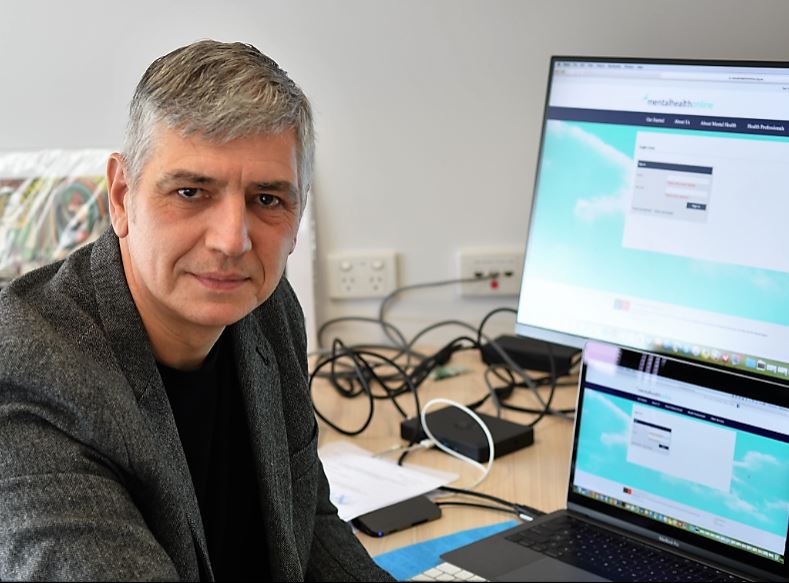
Almost 1 in 30 Australians experience Obsessive-Compulsive Disorder (OCD) at some stage in their life.
OCD, previously recognised by the World Health Organisation as a top 10 (#9) cause of disability in the world, has been studied closely by Flinders University Professor Mike Kyrios, Vice-President of the College of Education, Psychology and Social Work.
After leading research showing that online treatment is equally effective as mainstream face-to-face consultation to curb OCD behaviours, Professor Kyrios has helped to develop an efficient new online means of delivering effective OCD treatment.
The OCD online treatment is now available for free and can be accessed from www.mentalhealthonline.org.au.
The program includes treatment strategies, expert commentaries, videos of people describing their OCD experiences, and downloadable resources.
The results are contained in a new paper, ‘Therapist-assisted Internet-based Cognitive-Behavioural Therapy versus Progressive Relaxation in Obsessive-Compulsive Disorder: A Randomised Control Trial‘, published by Journal of Medical Internet Research (DOI: 10.2196/jmir.9566).
This is the first research that evaluates internet-based delivery of Cognitive-Behavioural Therapy in an “apples-for-apples comparison,” and Professor Kyrios says it shows the outcomes to be favourable, across all ages, genders and condition intensities.
Better still, outcomes from the online treatment proved to remain effective when participants were re-assessed at follow-up.
Cognitive-Behavioural Therapy (CBT) is recognised as the most effective form of treatment for OCD – being three times more effective than medication – although access for face-to-face sessions with a clinical psychologist is often not possible.
“There’s also the added problem of OCD patients feeling such high degrees of shame that they don’t seek out treatment. As they have concerns about being judged, their condition deteriorates while it affects every aspect of their life,” Professor Kyrios says.
“Hence, the online treatment offers a unique treatment option – even allowing people to get a diagnosis of their condition without showing up to a clinic.”
The online treatment is an adaptation of an OCD treatment manual that Professor Kyrios commenced work on during the 1990s in Melbourne, and the recent addition of an interactive option to online treatment with a therapist via email has helped register strong participant engagement and enjoyment in the process.
Publication of results from this trial is the culmination of 10 years’ work on online OCD treatment, with Professor Kyrios saying the analysis and data places Australia as a world leader at the forefront of research with online treatments.
He says that while current research funding doesn’t recognise the burden of this disease, such advances as online treatment represent a giant breakthrough for broader public accessibility to OCD treatment.
Professor Kyrios highlighted that even those with moderate and severe OCD could benefit from online treatment.
Interactive online treatment is more time efficient for those affected by OCD and therapists. Face-to face appointments are limited to one person an hour, while online treatments can be accessed by patients at their convenience, even if they live in remote and regional areas where specialists are not available.
“A lot of people with low level OCD are not being assessed or treated, as much due to access problems as reluctance to being examined,” says Professor Kyrios. “The online option makes assessment and treatment more feasible.”
Reduced costs for patients using online treatments is another a major bonus. “Because OCD most frequently presents as a serious mental health problem, most people would require 20 to 26 sessions in a year to overcome their disorder. Medicare rebates for psychologists provides for 10 individual sessions,” says Professor Kyrios.
“Online treatment therefore becomes a very attractive option for many people.”
The next step is to make this technology truly interactive through the choice of video conferencing or portable with a mobile app being developed so that people can engage with the treatment – or plug into support mechanisms wherever and whenever they chose. This will be a significant step, as Professor Kyrios says there is not yet an evaluated, evidence-based OCD program that is available as an online app.
Professor Kyrios has also recently contributed to research entitled, ‘Attachment anxiety and self-ambivalence as vulnerabilities toward Obsessive Compulsive Disorder‘, published in the Journal of Obsessive-Compulsive and Related Disorders (https://doi.org/10.1016/j.jocrd.2018.06.002).
“We have tried to understand why people with OCD think in the way that they do,” says Professor Kyrios. “A person’s thinking is a map to their behaviours, and for OCD sufferers, their behaviours are ways of undoing unwanted thoughts they are grappling with.”
“Only with this understanding have we been able to develop ways of helping them evolve new, more reasonable thinking styles to break behavioural patterns in ways that they trust as being safe and manageable. With online treatment, we see they have the confidence to stick with the program and embrace change.”
These findings will be at the heart of a public lecture being delivered by Professor Kyrios at the Australian Academy of Science in Canberra today (Tuesday August 14), with Professor Helen Christensen from the Black Dog Institute.
The session, titled “The Science of Us: Mental Health” will focus on the use of progressive technologies in mental health, serving as a summation of his research into OCD, and other behaviour issues such as hoarding and compulsive shopping, and pointing to a way forward for better treatment solutions.

